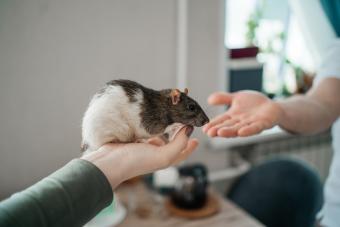
Rats have surprisingly bold, curious personalities. They're social, intelligent, and affectionate, and they make great pets because they're so big-brained. The best part is, you can easily train them to follow commands and do tricks, and they learn quickly. And that's not even the best part. Pet rats are also highly empathetic, communicative, and enjoy interacting with their pet parents. Training your pet rat is a blast, and it's easy to get started.
Rats Are Super Smart Pets
Even though they're small, rats are very intelligent. Wild rats don't have the best reputation, sure, but your pet is highly social and can learn to do all sorts of things. Rats are among the most studied animals on planet Earth - mice and rats make up 95% of all laboratory animals - and it's astonishing what they can learn and remember. Rats could even be one of the most intelligent animals in the world.

How Do Rats Communicate With Their Owners?
Rats are remarkably empathetic and social. They communicate using a combination of body language, vocalizations, and scent marking. Here are some ways rats communicate with their owners:
- Vocalizations: Rats use different types of vocalizations to communicate their feelings and intentions. They produce ultrasonic vocalizations that are usually inaudible to the human ear. However, some audible sounds include squeaking, chattering, or hissing, which can show excitement, annoyance, or fear.
- Body language: Rats communicate through body posture and movement. A relaxed rat may stretch out and groom itself, while a fearful rat may puff up its fur, freeze, or try to hide. Playful rats often perform a "popcorning" behavior, where they jump and twist in the air, showing happiness and excitement.
- Tactile communication: Rats enjoy physical contact and often use grooming, nuzzling, or nibbling to show affection and strengthen social bonds. They may also seek out their owner's hand for warmth or comfort.
- Scent marking: Rats have scent glands they use to communicate with each other. While this form of communication is mostly used among other rats, they may also use scent marking to establish their territory or mark their people.
- Training cues: Rats can be trained to understand basic cues and commands, such as coming when called or performing simple tricks. This learned behavior allows them to communicate with their owners more effectively.
Like dogs and cats, to better understand and communicate with your pet rat, you will need to observe their behaviors and vocalizations. Also, like dogs and cats, you must invest time in building a strong bond through positive interactions and training.
If you're not interested in training your pet rat, positive interactions can still help them become well-rounded adults, allowing you to bring them places and share pleasant time together.
Rats Need Socialization
Rats are very social animals, and they need to be with other rats. They are also very intelligent and will become bored if they don't have enough stimulation or things to do. They should never be left alone for long periods of time, as they will become lonely and depressed. This can lead to a variety of negative behaviors, such as biting, chewing on things, over-grooming, and depression that can ultimately lead to illness or death.
Rats bond strongly to their owners, just like dogs and cats do. They can even be taught tricks and are easy to housebreak. Rats need daily handling and interaction to keep them happy and healthy.

Rats are Highly Sensitive
Rats are also deeply empathetic animals, which means they are capable of understanding and sharing the feelings of other rats and, to some extent, their human companions. Studies have shown that rats display various behaviors that indicate empathy, including:
- Emotional: Rats can sense and respond to the emotions of other rats. For example, if one rat is in distress, other rats may exhibit signs of distress, as well.
- Consolation: Rats have been observed comforting and grooming other rats that are in distress or have experienced a negative event. This behavior is believed to be a sign of empathy and social bonding.
- Pro-Social: Rats are known to help other rats in need. They have been observed freeing trapped cage mates and sharing food with hungry companions.
- Altruism: Rats have shown altruistic behavior, meaning they will help other rats even at a cost to themselves. For example, they may choose to help a distressed rat rather than obtain a food reward.
These empathetic behaviors are essential for rats as they live in social groups and rely on cooperation and communication to survive. Their ability to empathize with their human caretakers also contributes to their popularity as pets, since they can form strong bonds and respond to their owners' emotions.
Do Rats Recognize Each Other and Their People?
Rats have an excellent memory and use a combination of scent, vocalizations, and visual cues to identify other rats and their human companions. They have scent glands that produce pheromones, which help them recognize members of their social group and establish their territory.
Pet rats can also get to know their owner's scent over time, which allows them to recognize their human companion. Rats are also able to recognize the vocalizations of other rats to ensure they are in their social group. Pet rats definitely form bonds with their owners, and do seem to recognize human voices. They seek out interaction with their owners, and you can help make that connection stronger with training.

Why Rats Need Enrichment
Enrichment is an important part of caring for your rat. It not only provides them with mental stimulation, but with social interaction they crave. Rats enjoy spending time with other rats and humans alike! They need a lot of attention from their owners in order to live happy, healthy lives. Rats also have a lot of energy and need plenty of exercise in order to remain healthy. They can easily become obese if they are overfed or given too much food at one time.
If you want a pet rat and have someone to share responsibilities with you, rats can get to know more than one person, allowing you to take turns providing interaction time.
Get Ready to Tend to Their Social Needs
If you want a pet rat, it's imperative to consider their social requirements. If you're looking for a pet that's hands-off, rats are not the companion for you. However, if you're searching for a pet who will enjoy being out of their cage, can learn tricks, and interact with you on a regular basis, a rat - or perhaps a couple of rats - could be exactly what you're searching for.






